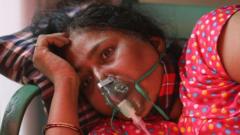On 24 March 2020, India implemented its first Covid lockdown, marking the beginning of a turbulent period that left a lasting impact on its people and systems. As the pandemic unfolded, journalists from BBC reported from the heart of the crisis, capturing the chaotic struggle of healthcare workers and families trying to survive the overwhelming wave of infections.
Soutik Biswas recalls a summer morning in 2021 filled with anguish as he received frantic pleas for help from a desperate school teacher. Her husband was fighting for breath in a Delhi hospital where oxygen was more scarce than hope. In those dark moments, Southeast Delhi felt like a war zone, where securing basic necessities became a battle for survival. Many families found themselves in desperate scrambles for oxygen cylinders and medicines, often forced to take matters into their own hands amid a failing healthcare system.
Yogita Limaye’s experience during the same second wave of Covid brought her to poignant scenes outside hospitals, where families cried out for help as they witnessed loved ones dying from lack of treatment. The enormity of the crisis was palpable as she reported on the struggles of healthcare professionals, caught in a frantic race against time. With harrowing descriptions of burnt bodies and overwhelmed crematoriums, Limaye portrays a nation grappling with grief, revealing that the pandemic was not just a health crisis but a profound human tragedy.
Vikas Pandey shares heart-wrenching personal accounts of loss and helplessness as he covered stories of families disintegrating under the weight of grief. Many times, he found friends and relatives reaching out for assistance with no solutions available. One particularly tragic story involved a man who lost both his father and pregnant wife to the virus within days, mirroring the widespread sorrow that engulfed countless families across the nation.
As the lockdown continued, Geeta Pandey painted a vivid picture of the desolation across India, with deserted streets and migrant workers desperately seeking a way home. Her memories of witnessing a young pregnant couple, stranded and exhausted on a highway, remain etched in her mind.
Anagha Pathak’s journey to document the effects of the lockdown led her to helplessly encounter a young couple among the sea of migrant workers returning home. Despite the protocols that prevented her from offering a lift, the emotional weight of the moment drove home the reality of the widespread suffering.
As BBC journalists reflect five years on, their powerful narratives serve as a testament to the resilience and tragedy experienced during the pandemic. Amidst the shared pain, these reports illuminate the human aspect of a crisis that left no one untouched, urging collective remembrance and compassion for all who endured the unimaginable.



















